On this page:
- Overview
- Goals of the OSSP
- Creation of the OSSP
- Funding
- The NIH Environment
- Candidates Eligible for the OSSP
- NIH Tenure Track Eligibility
- OSSP Alumni
- Resources
- Application Process
- Deadline
- Contact Information
Overview
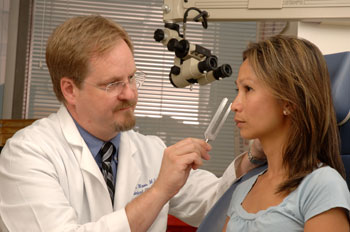
NIDCD Scientist Emeritus
Carter Van Waes, M.D, Ph.D., with a volunteer.
The NIDCD Otolaryngology Surgeon-Scientist Program (OSSP) is a mentored, junior faculty career development program within the NIDCD Intramural Research Program. The program typically requires two to five years, during which time the candidate designs and implements a career development plan that ideally integrates basic scientific and clinical research.
The key elements of support for the program are:
- Prospective and stable funding.
- Defined research and career mentorship.
- The research environment of the National Institutes of Health (NIH) and the NIH Clinical Center.
The participant, with the assistance of one or more mentors and an OSSP review committee, will design a translational research project that is of interest to the candidate and exploits the research strengths of the intramural NIH environment. Opportunities to integrate activities and resources of nearby academic otolaryngology programs are also available.
Goals of the OSSP
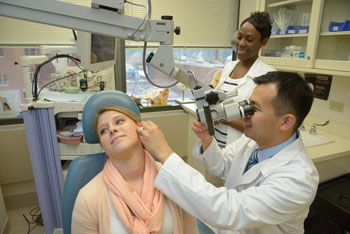
NIDCD neuro-otologist Wade Chien, M.D., assisted
by Angeline Thompson, R.N., performs otomicroscopy
on a research volunteer in the NIDCD clinic.
Bringing the enormous opportunities and potential of the recent advances in genetics, molecular biology, and cellular biology to the benefit of human communication disorders requires otolaryngology surgeon-scientists who can conceive, develop, and test novel diagnostic and therapeutic strategies through translational research that bridges basic science, medicine, and surgery. The OSSP advances NIDCD’s programmatic priority to promote biomedical and clinical research training and career development. This translational and clinical research program complements the rich basic science research within the NIDCD and other institutes in the NIH intramural program. Areas of priority and opportunity include disorders affecting hearing, balance, taste, smell, voice, speech, and language. Current programs have advanced the capability for preclinical and clinical studies for interventions in these disorders. This program is designed to support developing surgeon-scientists to accomplish this important and exciting work.
The OSSP aims to promote training and research opportunities for physicians committed to pursuing translational research by providing an optimal environment in which to develop the skills necessary for cutting-edge, translational research on human communication processes in health and disease. We intend to develop a cadre of researchers who can compete for faculty positions at the NIH and other premier institutions around the world, and who will produce a body of work that substantially advances our understanding and clinical management of human communication disorders.
Creation of the OSSP
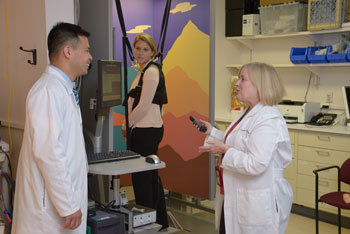
Former Chief of Audiology Carmen Brewer Ph.D. (right),
and Wade Chien, M.D. (left), discuss the use of
posturography for the study of balance disorders.
The NIDCD has been training otolaryngologist-scientists since 1995, with leading NIH and academic otolaryngologist surgeon-scientists among its alumni. The program is a junior faculty level career development program that is comparable to extramural mentored K-award programs. Most participants have already completed an otolaryngology residency or subspecialty fellowship. Typical sub-specialty fellowship training often does not provide adequate research experience upon which to build an enduring and robust independent research career, particularly when clinical research with human volunteers is involved. The purpose of the OSSP is to provide the necessary training—with formal research and career mentorship and strong support—for a successful transition to an independent tenure-track surgeon-scientist position.
Funding
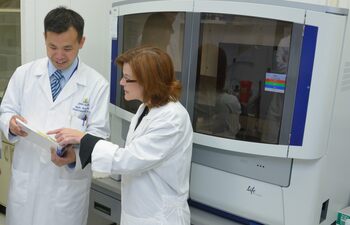
Wade Chien, M.D., and Lisa L. Cunningham, Ph.D.,
NIDCD scientific director, discuss the use of next-generation
sequencing in the NIDCD Clinical Genomics Core Facility.
The NIH intramural research funding mechanism provides unique advantages for developing scientists and research programs. Research funding is committed concurrently with the appointment of the candidate. The candidate begins research as soon as the research proposal is developed and approved. Demonstration of appropriate annual progress ensures continuous funding throughout the training period. This minimizes the time spent seeking funding and maximizes the time spent on research.
The NIH Environment
The NIH Intramural Research Program and the NIDCD Division of Intramural Research are unique. NIDCD intramural laboratories are located in the NIH Clinical Center and the Porter Neuroscience Center, both located on the NIH campus in Bethesda, Md.
The Porter Center brings together NIDCD and NIH scientists to foster interaction and innovation in communication and broader neurosciences. The facility harbors many core research facilities and a world class animal facility to support investigators.
The NIH Clinical Center is the largest research hospital in the world. It comprises 267 inpatient beds, 15 outpatient clinics, 12 operating rooms, and manages ~60,000 outpatient and 7,000 inpatient admissions annually. The Clinical Center provides state-of-the-art diagnostic, treatment, and research facilities to more than 1,000 credentialed physicians, dentists, Ph.D. scientists and clinical experts across many disciplines. The Clinical Center provides care only for patients who are eligible for and enrolled in an NIH clinical research study; its environment is thus completely oriented toward clinical research, and an ideal arena in which to develop skills in translational research.
The intramural funding mechanism encourages and rewards innovative research. The administrative and physical organization facilitates collaboration among investigators of many different institutes, promoting cross-fertilization of ideas from diverse disciplines. Participants will thus have the opportunity to work with a wide range of talented and creative scientists within and outside the NIDCD.
The OSSP has developed partnerships with academic and government hospitals worldwide. Regional academic otolaryngology programs include Johns Hopkins University Medical Center, Georgetown University Medical Center, George Washington University Medical Center, and Walter Reed National Military Medical Center. Joint educational, training, and clinical opportunities and appointments with these institutions further increase the depth and breadth of training in the OSSP. The OSSP offers flexibility to customize the site(s), type, and extent of clinical and surgical activity to best meet the career development objectives of the surgeon-scientist.
Candidates Eligible for the OSSP
We seek ambitious, creative, and insightful clinicians with the drive and vision to lead the global community of otolaryngology-head and neck surgery and leverage advances in basic science toward better care for patients. Candidates should demonstrate outstanding scholarly achievement and accomplishment throughout their career. Candidates should be able to identify a relevant research topic and work with NIDCD and NIH faculty to develop a research program that integrates basic science and clinical otolaryngology. Strategic development of an integrated research program with a high probability of long-term success is an essential component of OSSP. It is the responsibility of the Intramural Research Program to provide participants with the tools to succeed in the design and execution of the research project. Applicants will be American Board of Otolaryngology-certified or -eligible in otolaryngology-head and neck surgery or an affiliated subspecialty from programs accredited by the Accreditation Council for Graduate Medical Education (ACGME). U.S. citizenship is required.
Interested candidates may apply to the program either before completing their otolaryngology residency or subspecialty fellowship, or at any time up to five years after completing their postgraduate training.
NIH Tenure Track Eligibility
Successful completion of the OSSP is not a guarantee of a tenure-track faculty appointment at the NIDCD or other NIH institutes. All tenure-track positions in the NIH intramural program are created based upon need and availability of resources. They are filled following a national search and with the concurrence of the scientific director and director of the institute as well as the NIH deputy director of intramural research. A participant who successfully completes the OSSP is expected to be extremely competitive for tenure-track positions either within the NIH intramural program or at other premier academic medical research institutions seeking to hire otolaryngologist-scientists. The OSSP includes training opportunities in writing grants and research proposals in preparation for a transition to support by extramural NIH funding.
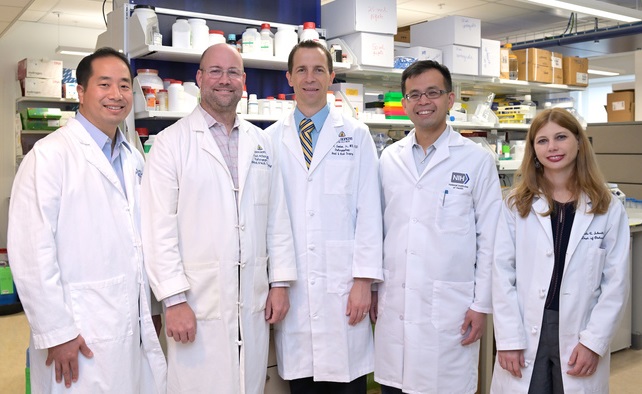
The NIDCD Otolaryngology Surgeon-Scientist Program
(OSSP) is a mentored, junior faculty career development
program within the NIDCD Intramural Research Program.
Surgeon-scientists in the program as of 2019 were
(left to right): Michael Hoa, M.D.; Clint T. Allen, M.D.;
Nyall R. London Jr., M.D., Ph.D.; Wade Chien, M.D.;
Nicole C. Schmitt, M.D.
Source: Marleen Van den Neste
OSSP Alumni
Five surgeon-scientists have successfully completed the program:
- Nicole C. Schmitt, M.D.
- Clint T. Allen, M.D.
- Nyall R. London Jr., M.D., Ph.D. (Note: Dr. London is continuing his OSSP work at the National Cancer Institute.)
- Wade Chien, M.D., FACS
- Michael Hoa, M.D.
Resources
The OSSP provides generous resources that maximize the probability of success. All participants receive a competitive salary and benefits, supporting a balance for protected research time and clinical care. Research resources depend upon experience and productivity prior to and during participation in the OSSP. Resources for participants with minimal prior experience will support their operating expenses while they obtain initial training in a fully-mentored research environment. Resources may be increased, depending upon productivity and potential, to support a limited number of additional research staff, as well as office and laboratory space for the participant and laboratory staff.
An annual budget is provided for laboratory reagents and supplies. Support for clinical research, attendance at scientific meetings, journal subscriptions, etc., is also provided. This package is provided prospectively and is contingent upon satisfactory research productivity and career development. Progress will be reviewed semi-annually during the first year and annually thereafter by the research mentor, NIDCD scientific and clinical directors, and an OSSP review committee comprised of NIDCD and NIH investigators.
Application Process
Applicants should submit:
- A curriculum vitae.
- A brief letter of interest.
- A letter of recommendation from the director of their most recent clinical training program (usually the fellowship program director) to the director of the OSSP program, listed below.
- Names and contact information for three former research and/or clinical mentors who can serve as references.
Suitable applicants will be contacted to discuss the program, and a subset of those applicants will be invited to NIH in Bethesda, Maryland, to interview with the faculty of the institute. Acceptance into the program will be offered to qualified applicants, at which point they should identify a mentor and begin to design the research project. In the first 2 months, a brief written proposal and presentation will be prepared by the applicant with the assistance and concurrence of the mentor.
Deadline
The deadline for applications is October 31 of the year preceding the typical July 1 starting date.
The NIH is an equal opportunity employer and encourages applications from women and minorities.
Contact Information
Questions and applications regarding the NIDCD Otolaryngology Surgeon-Scientist Program should be addressed to:
Elyssa Monzack, Ph.D.
Deputy Scientific Director, NIDCD/NIH
NIHBC 35A - PNRC II BG RM GF-109
35A Convent Drive
Bethesda, MD 20892
Phone: 301-827-4184
Email: monzackel@mail.nih.gov

